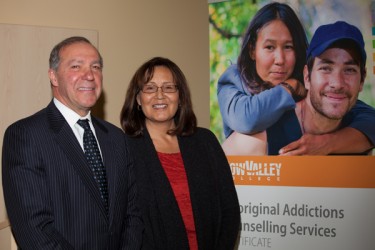Article Origin
Volume
Issue
Year
A Calgary college in partnership with a First Nations organization has launched an Aboriginal-focused addictions certificate program, which promises to provide cutting edge education and training for addiction councillors.
Bow Valley College and the Sunrise Native Addictions Services Society introduced the innovative program Nov. 14.
The Aboriginal Addictions Counselling Services Certificate, which begins in the fall 2012, includes 10 courses and three community practicum placements over 38 weeks. The curriculum will be delivered through training provided at SNASS, with tools delivered to support individuals, families, and communities in identifying and managing addictions through prevention and treatment programs.
“A partnership with an established organization like SNASS will ensure graduates of this program can immediately begin helping individuals and their families recover from the destructive effects of addiction,” said Dr. Bill DuPerron, program creator and dean of Health, Justice and Human Services at BVC.
Graduates of the AACSC will have a variety of career opportunities available to them, such as work in correctional institutions, social and child services facilities, emergency shelters, and community-based addiction centres.
The course will be an asset to those needing addiction services, said Eve MacMillan, executive director of SNASS.
She hopes the certificate program will employ more First Nations addiction counsellors throughout Aboriginal communities in Alberta.
“We’re looking for healthy Aboriginal addictions counsellors in Calgary and surrounding areas to hire,” MacMillan said.
“The problem of addiction is not going away. The need is there,” she said.
“There needs to be a continuum of services for Aboriginal people,” she continued. “Aboriginal people have a different world view and the services we offer here are spiritual and that is key.”
According to MacMillan and DuPerron, the college certificate program is the country’s only Aboriginal-specific addictions curriculum offered in a post secondary setting.
“What makes it unique is the focus on Aboriginal culture,” said DuPerron. He says that both First Nation instructors and mainstream addictions specialists will be working together to provide a holistic approach to treating addiction.
SNASS mandate follows the abstinence-based 12-step program plan, but it also tailors addiction counselling to the specific needs of Aboriginal clients, said MacMillan. One-on-one Elder counselling and the sacred practice of smudging with sweet grass and sage are ceremonial rituals wrapped up in the new counselling training program.
MacMillan said everything from residential school trauma to basic Aboriginal history will be addressed.
SNASS staff are currently enrolled in the pilot program, which began in October. They are completing the work on a part-time basis so as they can remain employed while completing their training.
“We wanted to be able to offer it to our staff as a pilot to ensure what is being offered is what we were envisioning it to be,” she explained.
“It’s very interesting because a lot of it is understanding the historical past of where we come from as Aboriginal people,” said addictions course participant Loretta Parenteau- English. “It looks at why Aboriginal people turn to addiction because of something that’s intergenerationally passed down.”
Parenteau-English, who is a family program counsellor at SNASS, is one of 10 counsellors from the organization that enrolled in the pilot program this fall.
“The course gives all employees a greater perspective and provides a bigger picture of what we’re dealing with,” she said.
Full time enrolment in the program will cost each student an estimated $4,000.
The ministries of Alberta Health and Wellness and Advanced Education and Technology helped fund the program as part of their Health Workforce Action Plan.
Photo caption: Dr. Bill DuPerron, BVC’s dean of Health, Justice and Human Services, with Eve MacMillan, director, Sunrise Native Addictions Services Society.
- 3372 views

